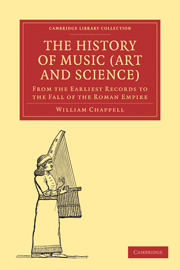Summary
It is clear that ancient Greek singing must often have caused a severe strain to the voice. If we take the lowest of the five principal middle scales, the “manly and severe” Dorian, the key-note was tenor “d,” in the space immediately below the treble clef, and the Octave below it was D on the third line of the bass. Suppose only the small lyre or Kithara, if an Octave in compass. It would extend a Fourth below the key note, viz., to tenor “a,” and a Fifth above it, to treble “a.” That is a high chest note for an ordinary tenor voice.
Our ancient Greek must have thrown back his head, and have filled his chest to the fullest, if he wished to declaim his “severe, firm, and manly” addresses to Apollo from so high a key-note as D. Aristotle says that few persons could sing the Nomes, called “Nomoi orthioi,” on account of their high notes (Prob. xxxvii. Sect. 19). That may readily be imagined. The comment, however, tends to show that regard was paid to pitch; and Plutarch says of Nomes, that they were not to be transposed. Yet, on the other hand, are we to assume that all were debarred from chanting to Apollo who could not sing so high? Some of the ancients invited the god to supper, and must then have addressed him. Perhaps they only took part in a pæan.
- Type
- Chapter
- Information
- The History of Music (Art and Science)From the Earliest Records to the Fall of the Roman Empire, pp. 107 - 135Publisher: Cambridge University PressPrint publication year: 2009First published in: 1874



